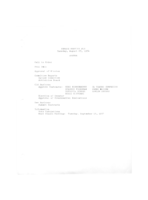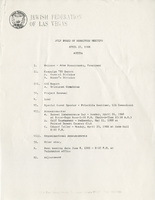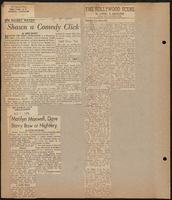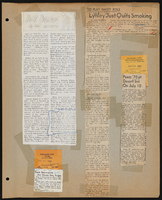Search the Special Collections and Archives Portal
Search Results

Meeting minutes for Consolidated Student Senate, University of Nevada, Las Vegas, August 27, 1974
Date
Archival Collection
Description
Text

Jewish Federation correspondence, meeting minutes, and other records, item 18
Description
Jewish Federation of Las Vegas (JFLV) Board of Directors Meeting minutes, April 20, 1988.

Transcript of interview with Shecky Greene by Barbara Tabach, June 5, 2018
Date
Archival Collection
Description
At the time of this interview, Shecky Greene (1926 - ) is energetically snuggled into his modest Henderson home. His wit and signature sense of humor are at in full swing. Shecky sees a joke in every nook and cranny of a conversation and seamlessly spins the moment with a tune or voice characterization. A native of Chicago, his given name is Fred Sheldon Greenfield. His Jewish parents, Bessie and Carl Greenfield raised Shecky and his older two brothers in a secular but kosher setting. He recalls honing his humor as a child and creating his path to a decades-long career in comedy lounges and in film. His narrative glitters with names of Las Vegas entertainment history. He also talks about his passion for the St. Judes Ranch in Boulder City.
Text

Transcript of interview with Rita Golub by Alisa Fife, March 14, 1981
Date
Archival Collection
Description
On March 14, 1981, Alisa Fife interviewed her friend’s grandmother, telephone operator and housewife, Rita Golub (born May 1st, 1920 in New York City, New York) in her home in Las Vegas, Nevada. The interview covers Rita Golub’s life in Las Vegas and includes discussion in regards to Queen Mother. Rita also discusses the Strip, night entertainment and social and religious activities in Las Vegas.
Text

Transcript of interview with Lyn Robinson by Barbara Tabach, September 18, 2014
Date
Archival Collection
Description
One day in 2012, UNLV student Lyn Robinson spied a posting on the bulletin board for a photographer for the Sperling Kronberg Mack Holocaust Resource Center. She was an art major with a concentration on photography. She was also had a deep appreciation of the horror of the Holocaust and what the survivors she would take photos of had endured. Thus began a two year project, during which she took photos of over sixty survivors. Her images are preserved at UNLV Special Collections & Archives. Prints are displayed at the Sperling Kronberg Mack Holocaust Resource Center. On September 18, 2014, Lyn shared her work for this oral history recording. She is a native of Florida, daughter of a horticulturist father and pianist mother.
Text
Rudiak, George, 1915-1995
George Rudiak (1915 – 1995) was born in Moscow, Russia. At the age of five, George emigrated with his Jewish parents to the United States in 1920. He was raised in Los Angeles, California and received his law degree from the University of California at Berkeley in 1942.
1942 was the same year the draft into armed services dogged him. Rather than be drafted, he chose to enlist in the US Army Corps. The same year he married the energetic Gertrude (née Rightman) Rudiak.
Person



